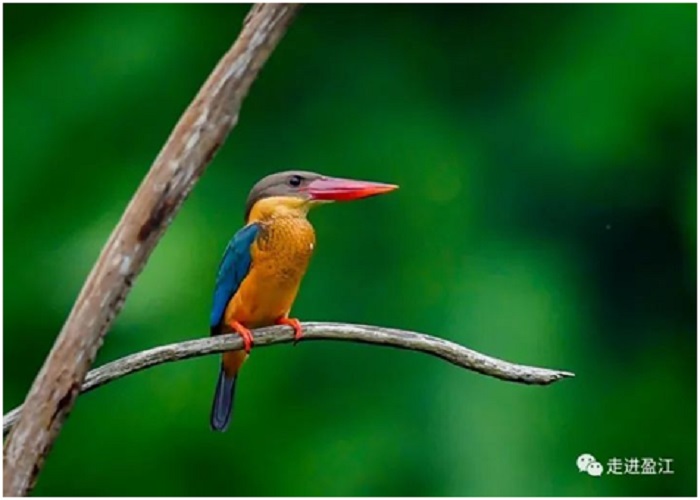



Southwest China’s Yunnan province is reaping rewards of its efforts to improve ecological environment and foster a green way of development.
In Yingjiang county, Dehong Dai and Jingpo autonomous prefecture, Yunnan province, a stork-billed kingfisher can generate 500,000 yuan ($78,342) of economic value, said Yang Xiaojun, a research fellow at Kunming Institute of Zoology, Chinese Academy of Sciences (CAS).
In China, stork-billed kingfisher has only been found in Yunnan province, according to Yang, who disclosed that a bird of the kind was spotted in Nabang township of Yingjiang county in October 2017. The bird stayed in the local wetlands for 197 days and attracted many bird lovers, who came to see and take pictures of it.
It’s estimated that those bird lovers who ate and lived in Nabang township brought to the place at least 500,000 yuan worth of economic benefits.
In recent years, bird-watching has become a calling card of Yingjiang county. Bird lovers have flocked to the county from various parts of China for river tern, hornbill and other bird species, effectively stimulating local consumption.
The experience of Yuanyang county, Honghe Hani and Yi autonomous prefecture of Yunnan, in balancing ecological restoration and economic development has proven that man and nature can coexist in harmony and that a sound ecology and environment is not just a natural asset, but also an economic one.
People of Hani ethnic group in the county have reclaimed terraces and promoted forest restoration around terraces, effectively revitalizing forests, which are considered reservoirs of wildlife.
Those who have been designated to ensure unimpeded flow of water in terraces work hard to make sure mountains, rivers, forests, farmlands, lakes, and grasslands function smoothly as sound ecological systems.
In seeking multiple uses of the same water resource, multiple ways to generate economic benefits with the same farmland, and multiple sources of income for each household, Yuanyang county used terraces to raise ducks and fish while growing rice, and launched a series of finely processed products, including free-range ducks, fish, and red rice.
In addition, the county has boosted the development of its cultural tourism integrating folk customs, catering services, local products and other relevant fields through an e-commerce platform.
By leveraging its ecosystems, Yuanyang has cultivated eco-friendly and characteristic industries that are unique to the locality and gained competitive advantages in relevant fields.
Some local governments in Yunnan province have provided seedlings of dendrobium nobile for local residents and encouraged them to plant them in the forests they have been entitled to manage and use by contracts with the government, according to an expert in orchid protection.
The move has effectively increased the distribution of dendrobium nobile in mountains, said the expert, who recalled that at first local governments planted artificially bred dendrobium nobile in the wild, but found that local residents almost dug them all and took them home.
A similar case has happened in Nanhua county, Chuxiong Yi autonomous prefecture, Yunnan province. The government of Nanhua signed contracts with local residents for the use of mountains to increase the distribution of matsutake after finding that many local people picked matsutake and caused a significant decline in local resources of matsutake.
Since the contracts have clearly defined the right and responsibility to use and manage land in mountains, local residents intentionally preserve some old matsutake for reproduction.
By motivating local residents to voluntarily protect matsutake, these areas have achieved rich results both in improving ecology and increasing people’s income.
Guidance from the government and the participation of enterprises have played important roles in Yunnan’s endeavors to foster a green way of development.
In a bid to help increase the income of residents in rocky desertification areas, Guangnan county, Wenshan Zhuang and Miao autonomous prefecture of Yunnan, has invited scientific research institutes for solving problems concerning the artificial breeding of Malania oleifera, an endangered and highly valued tree species under second-class national protection in China, as well as the purification of neuronic acid, and supported relevant enterprises in expanding the market.
Thanks to these efforts, Malania oleifera has become the local people’s secret of income increase and happy life.
The experiences of various areas in Yunnan have proven that when people have deep reverence for nature, respect nature, follow nature’s laws and protect nature, and translate ecological strengths into development advantages driven by green transition, they can certainly bring out the great benefit that green mountains and clear waters can offer and secure economic growth while advancing environmental protection.


The Humanitarian Service Diamond Awards has.
A Chinese Company, Inner Galaxy Steel.


The Programme Coordinator, Regulatory, Compliance and.


A Non-Governmental Organization (NGO), Committee for.
The Trustfund Pensions Limited has chided.


The House of Representatives Committee on.
The China General Chamber of Commerce.


Senator Chuka Utazi who represented Enugu.


An Abuja based Legal Practitioner, Ugochukwu.


The African business community in Yiwu,.
Leave a Comment